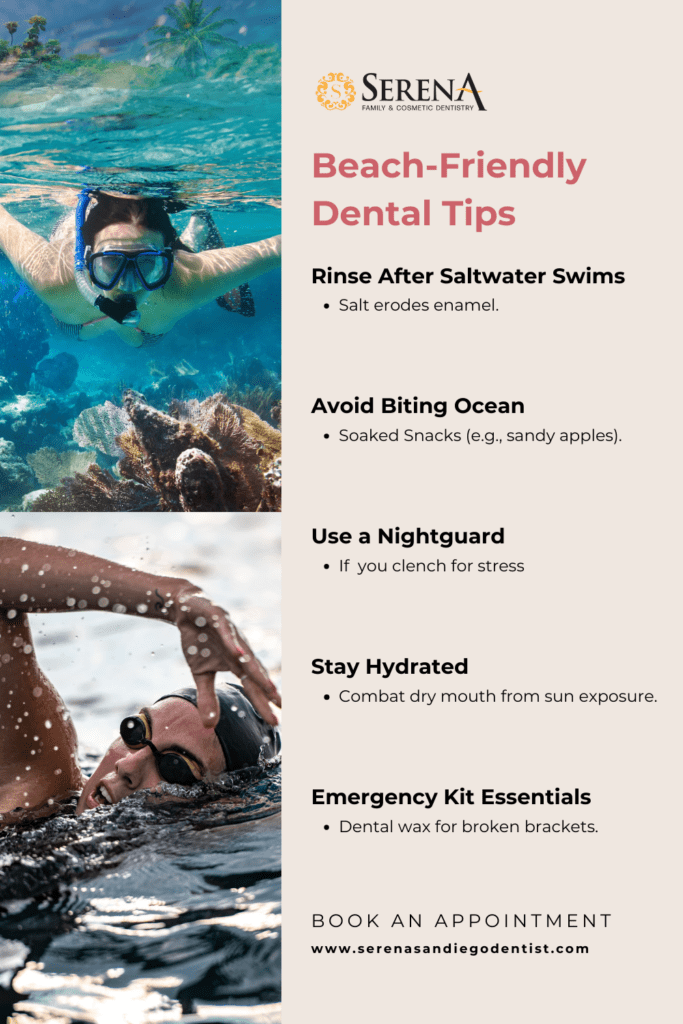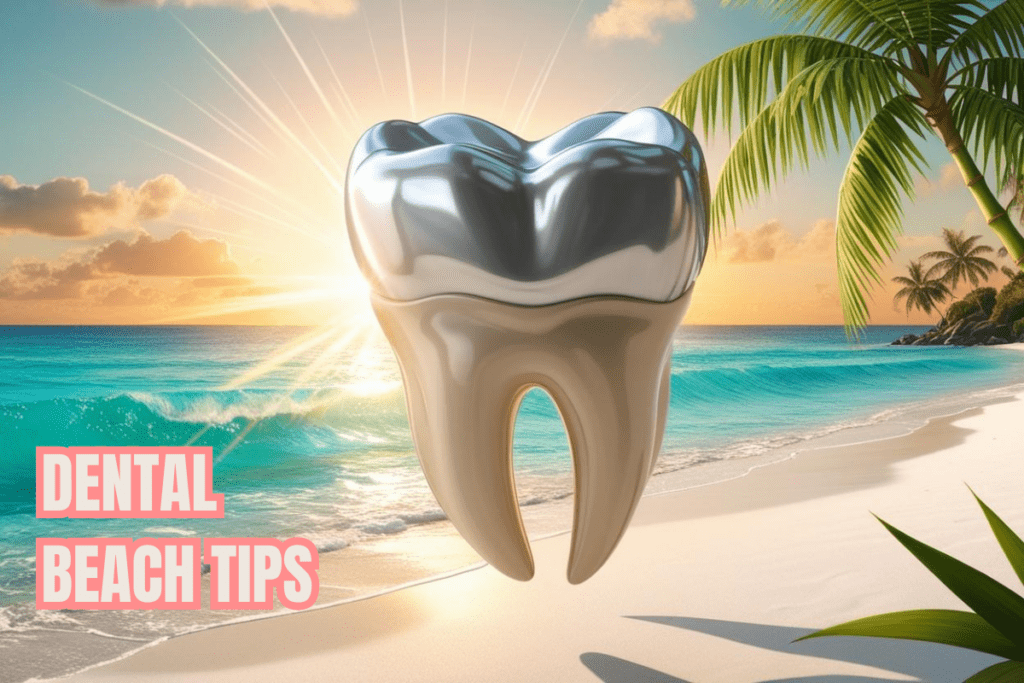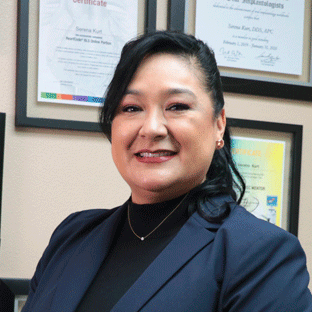Beach dental tips are essential for San Diego residents who love the sun and surf but still want to maintain a bright, healthy smile. Saltwater, sand, and sun can take a toll on your oral health, leading to issues like enamel degradation and dry mouth. At Serena Family & Cosmetic Dentistry in Claremont Mesa, we have solutions to help you keep your teeth healthy while enjoying the beach. Let’s take a look at how to protect your smile this summer.
Rinse After Salt Water Swims: Salt Erodes Enamel
The saltwater in the ocean can be incredibly damaging to your teeth. The salt in the ocean water can cause tooth enamel to demineralize, making your teeth more susceptible to sensitivity and cavities. After every swim, especially in the saltwater of San Diego beaches, rinse your mouth with fresh water to wash away the salt and protect your enamel. This simple measure can prevent long-term damage to your teeth and ensure they stay strong and healthy during your beach adventures. Remember: the quicker you rinse, the less time the salt has to work on your teeth. The Science of How Salt Water Works on Teeth Salt water acts like a weak acid on your teeth, slowly removing the protective layer that prevents cavities. Over time, this can cause teeth to become weaker and more sensitive.
The Science of Saltwater on Teeth
Salt water acts like a weak acid on teeth, slowly removing the protective layer that prevents tooth decay. Over time, this can cause teeth to become weaker and more sensitive. By understanding this process, you can take proactive steps to protect your oral health. The pH of seawater can range from neutral to slightly alkaline, but the minerals it contains (primarily salt) can still have an erosive effect when in contact with teeth for a long time.
Tips for Clairemont Mesa Residents
When you’re at the beach, always carry a bottle of fresh water with you. Rinsing your mouth immediately after a swim not only helps remove the salt but also rehydrates your mouth, which can become dry after a dip in the ocean. If you’re at the beach for an extended period, consider bringing a reusable water bottle to encourage regular hydration and rinsing.

Avoid Biting Ocean-Soaked Snacks (e.g., Sandy Apples)
When you’re enjoying a day at the beach, you may be tempted to eat whatever snacks are on hand, but be careful with sea-flavored foods. Sand can stick to snacks, causing microabrasions on teeth, or get stuck, causing gum irritation and even tooth decay. When you grab a piece of fruit from the cooler, give it a quick rinse to remove the sand. Opting to eat snacks that are less sandy, like hard cheeses or nuts, is also good for dental health due to its low calcium and sugar content.
The Risks of Sand in Your Diet
The sand acts like a natural abrasive; when you chew on a sandy snack, it wears away tooth enamel, leading to premature wear and possible tooth problems. This can be especially problematic for people who are having dental surgery or have sensitive teeth.
Enjoying Beach Snacks Safely
Snack choices can make a big difference. If you want to eat sandy food, rinse it off ahead of time or stick to prepackaged snacks, which are less likely to be contaminated by beach trash. Also consider snacks that naturally clean your teeth, like crunchy vegetables, which can help remove stains from your teeth.
Use a Nightguard: If You Clench for Stress
The relaxing atmosphere of the beach can mask the stress of everyday life, but for many people in San Diego, this stress manifests itself as grinding or clenching their teeth, especially at night. This can lead to broken teeth, jaw pain, or headaches. Wearing a custom mouth guard can protect your teeth from the wear and tear caused by bruxism. At Serena Family & Cosmetic Dentistry, we can customize a bite splint for your mouth to ensure comfort while protecting your dental health. Bite splints can also help treat TMJ problems that are made worse by stress.
Stress Management and Dental Health
The connection between stress and oral health is important. Treating the physical symptoms caused by stress with dental care can also help your overall health. Techniques such as meditation or relaxing at the beach can help, but a bite splint is a direct intervention for your teeth.
How to Get Your Nightguard
Don’t let stress ruin your teeth. Schedule a consultation with us to get a custom bite splint installed to keep your smile looking good all night long. We’ll help you understand insurance coverage so you can afford this option.
Stay Hydrated: Combat Dry Mouth from Sun Exposure
The sun and wind at the beach can quickly dehydrate you and reduce saliva production. This dry mouth condition can lead to increased plaque formation and an increased risk of tooth decay. Staying hydrated doesn’t just mean drinking water for your body; it’s also essential for maintaining a healthy oral environment. Drinking water can help flush away harmful bacteria and acids, keeping your mouth moist and your teeth clean. Hydration also encourages saliva production, which naturally cleans your mouth.
Hydration and Oral Health
Saliva plays a vital role in neutralizing acids, cleaning your mouth, and remineralizing tooth enamel. When you’re dehydrated, this protective mechanism weakens, increasing the fragility of your teeth. Saliva also contains minerals that help repair early tooth decay.
Hydration Tips for Beachgoers
Bring a reusable water bottle to the beach and drink water regularly. If you don’t like plain water, you can use citrus or cucumber slices to rehydrate and still stay hydrated. Remember that adequate hydration also contributes to overall health in hot weather.
Emergency Kit Essentials: Dental Wax for Broken Brackets
Accidents can happen at any time, especially when you’re at the beach. For people who wear braces, a broken bracket or wire can be particularly painful. Dental wax is an important part of your emergency kit. It can be used to cover sharp or broken wires, preventing them from causing mouth sores or further damage until you can see a dentist. Plus, knowing how to handle minor dental emergencies can save time on your way back to the city.
What to Include in Your Dental Emergency Kit
In addition to dental wax, you should bring pain relievers, a small mirror to examine your teeth, and temporary fillings if you have fillings that tend to fall out. A list of emergency contact phone numbers, including your dentist’s, can also be invaluable.
Being Prepared in Clairemont Mesa
Whether you’re a local or just visiting a dental emergency kit can turn a potential disaster into a minor inconvenience. Keep one in your car or beach bag for immediate help. This preparation is especially helpful for families with children who don’t pay much attention to their dentures.
FAQs about Dental Tips
How often should I rinse after swimming in the ocean?
Ideally, you should rinse immediately after each swim to prevent damage to your tooth enamel.
Can insurance cover a custom night guard at your clinic?
Many insurance plans cover bite splints; we’ll help you check your coverage.
What if I don’t have dental wax in my emergency kit?
If you find yourself without wax, try covering any sharp edges with a piece of gum or soft food until you can see your dentist.
Are there beach-friendly snacks that are good for dental health?
Yes, think of snacks like nuts or cheese sticks, which attract less sand and are rich in calcium, which is good for your teeth.
How can I manage my dry mouth while at the beach?
In addition to drinking plenty of water, sugar-free gum or mints can stimulate saliva production.
Dental Tips
You don’t have to sacrifice dental health when you enjoy San Diego’s beaches. With these beach dental care tips, you can protect your smile from the unique challenges that come with the sun, sand, and sea. At Serena Family & Cosmetic Dentistry in Clairemont Mesa, we make sure your smile shines as brightly as a sunny day. Schedule a consultation today to learn more about protecting and improving your dental health.



